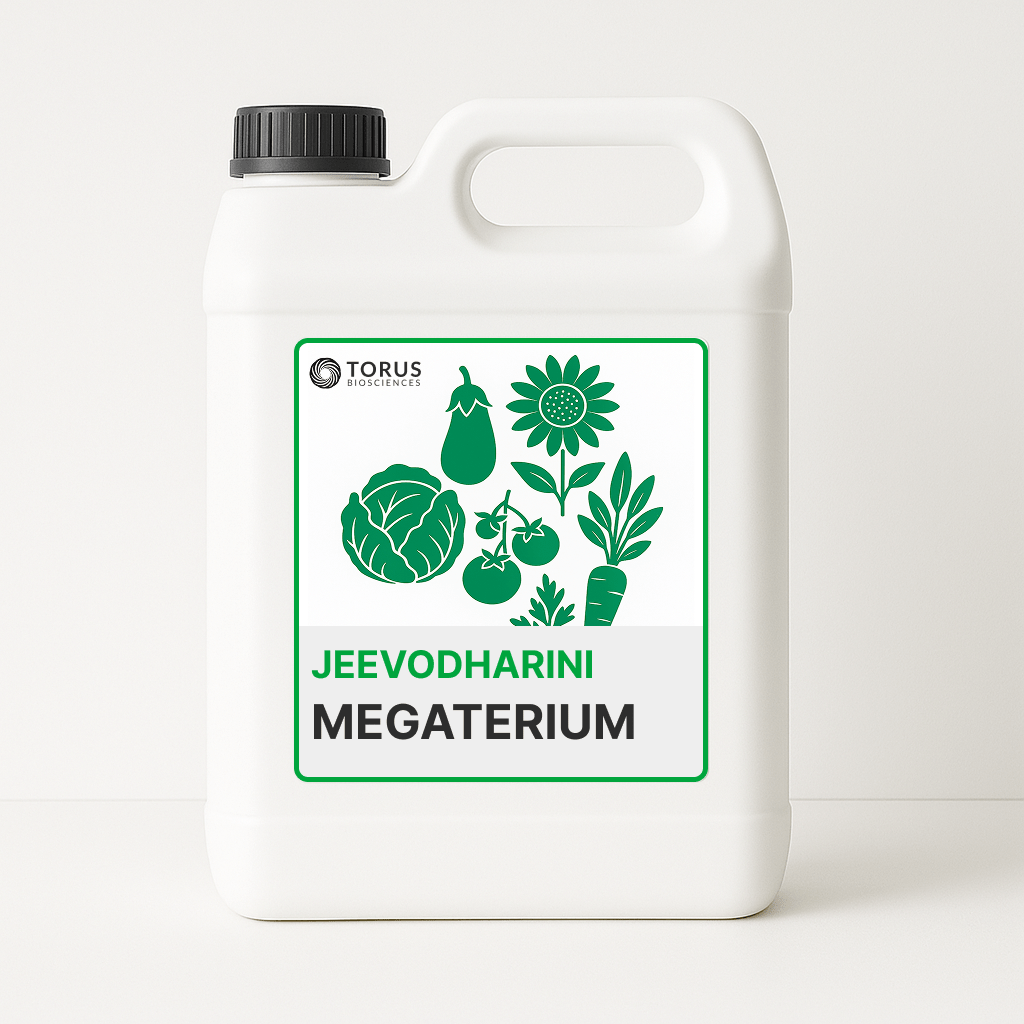
Megaterium
An aerobic phosphate solubilising bacteria that helps plants absorb phosphorous from the soil, reducing the need for chemical fertilizers.

Bacillus megaterium is a large, gram-positive, rod-shaped bacterium that serves as a powerful phosphate solubilizing microorganism (PSM) in agricultural systems. This beneficial bacterium secretes organic acids and phosphatase enzymes that convert insoluble forms of phosphorus in soil into plant-available forms, addressing one of the most common nutrient limitations in global agriculture.
Field studies demonstrate that Bacillus megaterium inoculation significantly improves phosphorus acquisition in diverse crops, particularly in alkaline and calcareous soils where phosphorus availability is severely limited by calcium fixation. Beyond phosphorus solubilization, B. megaterium provides additional plant growth promotion through multiple mechanisms.
Benefits
-
Phosphorus Solubilization: Bacillus megaterium releases powerful organic acids and phosphatase enzymes that convert insoluble phosphate compounds into plant-available forms. This microbial solubilization can mobilize 25-42% of fixed soil phosphorus, dramatically improving phosphorus use efficiency and reducing fertilizer requirements by 30-50%.
-
Enhanced Potassium Mobilization: Beyond its primary role in phosphorus solubilization, B. megaterium also releases compounds that weather potassium-bearing minerals in soil, increasing available potassium by 15-25% through similar organic acid-mediated mechanisms that dissolve mineral-bound nutrients.
-
Improved Plant Immune Function: Bacillus megaterium triggers induced systemic resistance (ISR) in plants by activating defense-related enzymes and biochemical pathways. Treated plants show 30-40% higher levels of defense enzymes like peroxidase and polyphenol oxidase, enhancing natural protection against various pathogens.
-
Soil Structure Improvement: The bacterium produces exopolysaccharides that bind soil particles into stable aggregates, improving soil structure, water infiltration, and root penetration. These microbial polysaccharides can increase soil aggregate stability by 15-30% over a single growing season.
-
Organic Matter Enhancement: Bacillus megaterium accelerates the decomposition of crop residues by producing cellulolytic and lignolytic enzymes, transforming complex carbon compounds into soil organic matter and humus. This process enhances cation exchange capacity and nutrient retention in soil.
-
Fertilizer Use Efficiency: By solubilizing bound nutrients and improving root development, B. megaterium increases the efficiency of applied fertilizers. Field trials show 20-35% reductions in phosphorus fertilizer requirements while maintaining or improving yields across diverse crop systems.
-
Soil Biological Activity: As a beneficial soil inhabitant, B. megaterium stimulates broader soil microbial activity and diversity, increasing populations of other beneficial microorganisms and enhancing cycling of multiple nutrients beyond phosphorus and potassium.
Suitable Crops
Bacillus megaterium demonstrates significant benefits across diverse cropping systems:
-
Cereals: Wheat, rice, and maize show 15-25% yield increases with enhanced phosphorus uptake, particularly in alkaline soils where phosphorus availability is naturally limited. Grain phosphorus content typically increases by 8-15%.
-
Vegetables: Tomato, pepper, and cucurbits respond strongly to B. megaterium inoculation with 20-30% yield increases and improved fruit quality parameters, including increased vitamin content and longer shelf life.
-
Pulses and Legumes: Chickpea, pigeon pea, and other pulses show enhanced nodulation and nitrogen fixation when co-inoculated with B. megaterium and appropriate rhizobia, as phosphorus availability directly impacts symbiotic nitrogen fixation efficiency.
-
Oilseeds: Sunflower, mustard, and groundnut demonstrate 15-25% yield increases along with improved oil content when treated with phosphate solubilizing bacteria, particularly in phosphorus-deficient soils.
-
Fruits and Orchards: Perennial fruit crops benefit from long-term B. megaterium soil populations, showing improved phosphorus nutrition, enhanced flowering, and fruit quality improvements with regular application.
-
Flowering and Ornamental Plants: B. megaterium application enhances bloom number, size, and longevity in flowering plants while improving overall plant vigor and stress resilience.
-
Low-Phosphorus Soils: The bacterium shows its most dramatic benefits in calcareous, alkaline, or phosphorus-fixing soils where chemical phosphorus fertilizers rapidly become unavailable to plants.
For optimal results, apply Bacillus megaterium to seeds before planting or directly to the soil around plant roots during early growth stages. The bacteria establish most effectively in well-aerated soils with adequate organic matter to support microbial metabolism. Maximum phosphorus solubilization occurs when soil pH is between 6.0-7.5, though the bacterium can function across a wider pH range.
Bacillus megaterium works synergistically with other biofertilizers, particularly nitrogen-fixers like Rhizobium or Azospirillum, as increased phosphorus availability enhances nitrogen fixation processes, creating complementary benefits when these organisms are co-applied.
Key Microorganism
Bacillus megaterium: This large bacterium (its name “megaterium” means “big beast”) produces potent phosphatase enzymes and organic acids that solubilize bound soil phosphorus. The bacteria secrete primarily gluconic, citric, and oxalic acids that create localized pH reductions around soil phosphate minerals, releasing phosphorus ions from calcium, iron, and aluminum complexes. Bacillus megaterium strains can solubilize 25-42% of insoluble soil phosphates, making this critical nutrient available for plant uptake. Additionally, the bacterium produces phytohormones, antifungal compounds, and forms endospores that ensure long-term survival in soil under adverse conditions.
Mechanism of Action
-
Organic Acid Production: Bacillus megaterium secretes primarily gluconic, citric, and oxalic acids that dissolve insoluble phosphate minerals through several mechanisms:
- Direct acidification of the rhizosphere microenvironment
- Chelation of calcium, iron, and aluminum ions that bind phosphate
- Competitive exchange of organic acid anions with phosphate on mineral surfaces
-
Phosphatase Enzyme Activity: The bacterium produces both acid and alkaline phosphatases that hydrolyze organic phosphorus compounds, releasing inorganic phosphate from nucleic acids, phospholipids, and phytates. These enzymes can access the 30-65% of total soil phosphorus typically bound in organic forms.
-
Root Growth Stimulation: B. megaterium produces plant growth hormones, particularly indole-3-acetic acid (IAA) and cytokinins, that stimulate root development and architecture. Enhanced root systems with greater surface area can explore larger soil volumes for accessing nutrients.
-
Endospore Formation: During adverse conditions, the bacterium forms resilient endospores that allow long-term survival in soil between growing seasons or during drought periods. These endospores germinate when conditions improve, ensuring persistent colonization of the rhizosphere.
-
Biofilm Development: The bacteria establish protective biofilms on root surfaces and soil particles, creating stable microenvironments where phosphorus solubilization processes are concentrated and protected from environmental stresses.
-
Siderophore Production: Many B. megaterium strains produce siderophores that chelate iron and make it available to plants, addressing iron deficiency while simultaneously releasing phosphorus that was bound to iron oxides.
Storage and Usage Instructions
For detailed application instructions, please refer to our Root Application Guide.
Available Variants




Boost productivity with our sustainable biological solutions.
Trusted by agricultural and waste management professionals for superior results.
Request pricing & availability